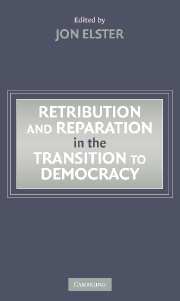1 - Introduction
Published online by Cambridge University Press: 03 December 2009
Summary
After the fall of Baghdad in April 2003, the issues of the “de-Baathification” of Iraq and of compensation to the victims of the previous regime were immediately raised. Historical analogies with denazification and decommunization abounded. For observers and actors who want to learn from the past, and to avoid the mistakes of the past, the contributions to the present volume should provide useful food for thought. As the Iraqi regime was hardly the last surviving dictatorship, the lessons may remain useful in the indefinite future.
In a change of political regime, incoming leaders often want to punish or neutralize agents and leaders of the previous regime. In a transition to an authoritarian or totalitarian system, these measures are usually taken by executive fiat. The purges of the German judiciary after 1933 (Müller 1991, ch. 8) or of German schoolteachers in the Soviet occupational zone after 1945 (Welsh 1991) were not constrained by democracy or the rule of law. After transitions to democracy from an authoritarian or totalitarian regime, however, the new leaders usually want to demarcate themselves from the practices of their predecessors. Sometimes, to be sure, they will claim that their former oppressors have no grounds for complaining if they are treated by their own lawless procedures (for an example see Woller 1996, pp. 140–41). More frequently, however, the return to democracy is accompanied by the desire to see transitional justice done in an orderly manner, to prove that “We are not like them,” as Vaclav Havel said.
Information
- Type
- Chapter
- Information
- Publisher: Cambridge University PressPrint publication year: 2006
References
Accessibility standard: Unknown
Why this information is here
This section outlines the accessibility features of this content - including support for screen readers, full keyboard navigation and high-contrast display options. This may not be relevant for you.Accessibility Information
- 3
- Cited by
